It’s been almost a month since the McElroy Shakespeare Celebration at Loyola University in Chicago, and I’ve still got it buzzing in my head. Seeing a brilliant cast of six students, two professional actors, student techs, and a faculty director bring my blue and green eco-theories about The Winter’s Tale to a live stage was the sort of thing that happens seldom in an academic career.
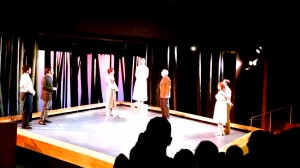
Statue scene
This post is partly a photo gallery, featuring images taken by Loyola grad student Lydia Craig.
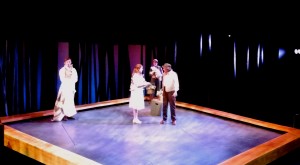
Sheep-shearing scene
In putting my contrast between green pastoral stasis and blue oceanic dynamism into practice, the actors reminded me how much stage choices get expressed through human bodies, rather than — or perhaps in addition to — language. We professors have a habit of digging down into words, while actors use bodies. It’s another reason we should work together sometimes.
I saw the difference performance makes most clearly in the staging of the famous “great creating Nature” exchange between Perdita and Florizel. In the second, “blue” and disruptive version of the scene, I asked the actors to look for ways to move past harmony into dynamism. They responded with two great performance choices that I’ll think about each time I return to this scene. When Perdita offered Polixenes “flowers of middle summer” (4.4.107) after he has bullied her into agreeing with his homily about Art and Nature, he refused to accept them. The visible lack of harmony between the two actors accented the lack of intellectual agreement in their argument. A few lines later, a leering Camillo grabbed Perdita’s arm and held her close to him when he spoke of leaving off “grazing” and living “only by gazing” (4.4.129-30), were he of her flock. I could feel the threat in my front-row seat.
The performed exchange emphasized the unsolved conflict between Perdita’s vision of youthful promise and the older aristocrats’ insistence on artistic and political control.
I’m left feeling unsettled about the core exchange itself. Perdita’s refusal to hybridize flowers seems like an intellectual mistake; Polixenes’s argument for an “art / Which does mend Nature — change it rather — but / The art itself is Nature” (4.4.95-97) makes a strong rational case. But the play’s sympathies are overwhelmingly with the young lovers. Polixenes uses logic and poetry, but the play casts its lot with Perdita’s feeling.
She’s the “Queen of curds and cream” (4.4.161), but perhaps also, as Florizel describes her, a blue creature of the Bohemian coast:
When you do dance, I wish you
A wave o’th’sea, that you might ever do
Nothing but that, move still, still on,
And own no other function. (4.4.140-43)
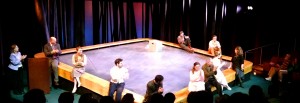
Cast takes a bow
At some point I’ll try to untangle this play’s engagement with blue and green, error and Nature, logic and love. When I do, I’ll credit the McElroy Shakespeare Celebration for helping me.

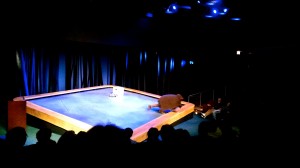
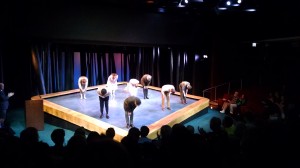
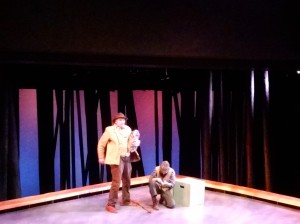
[…] exchange with the help of brilliant actors and directors at Loyola University of Chicago’s McElroy Shakespeare Celebration. After that talk-and-performance, I remember feeling “unsettled” about the […]